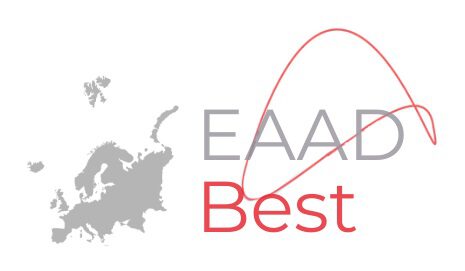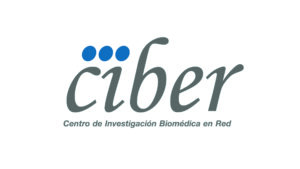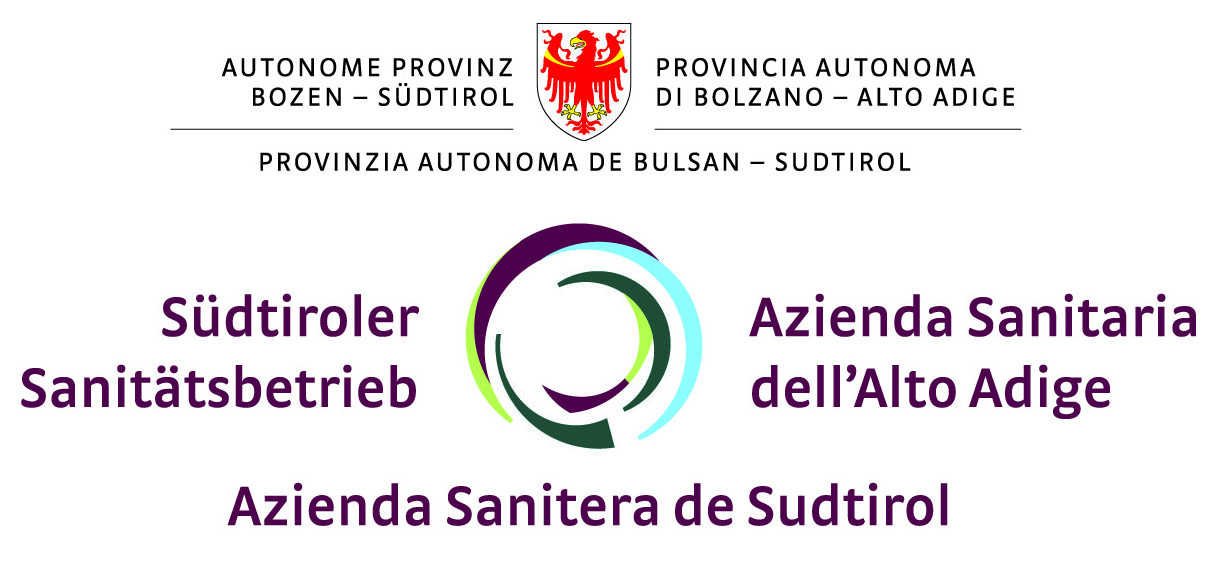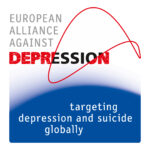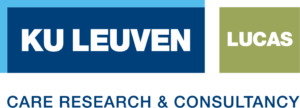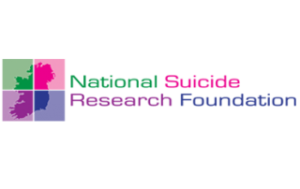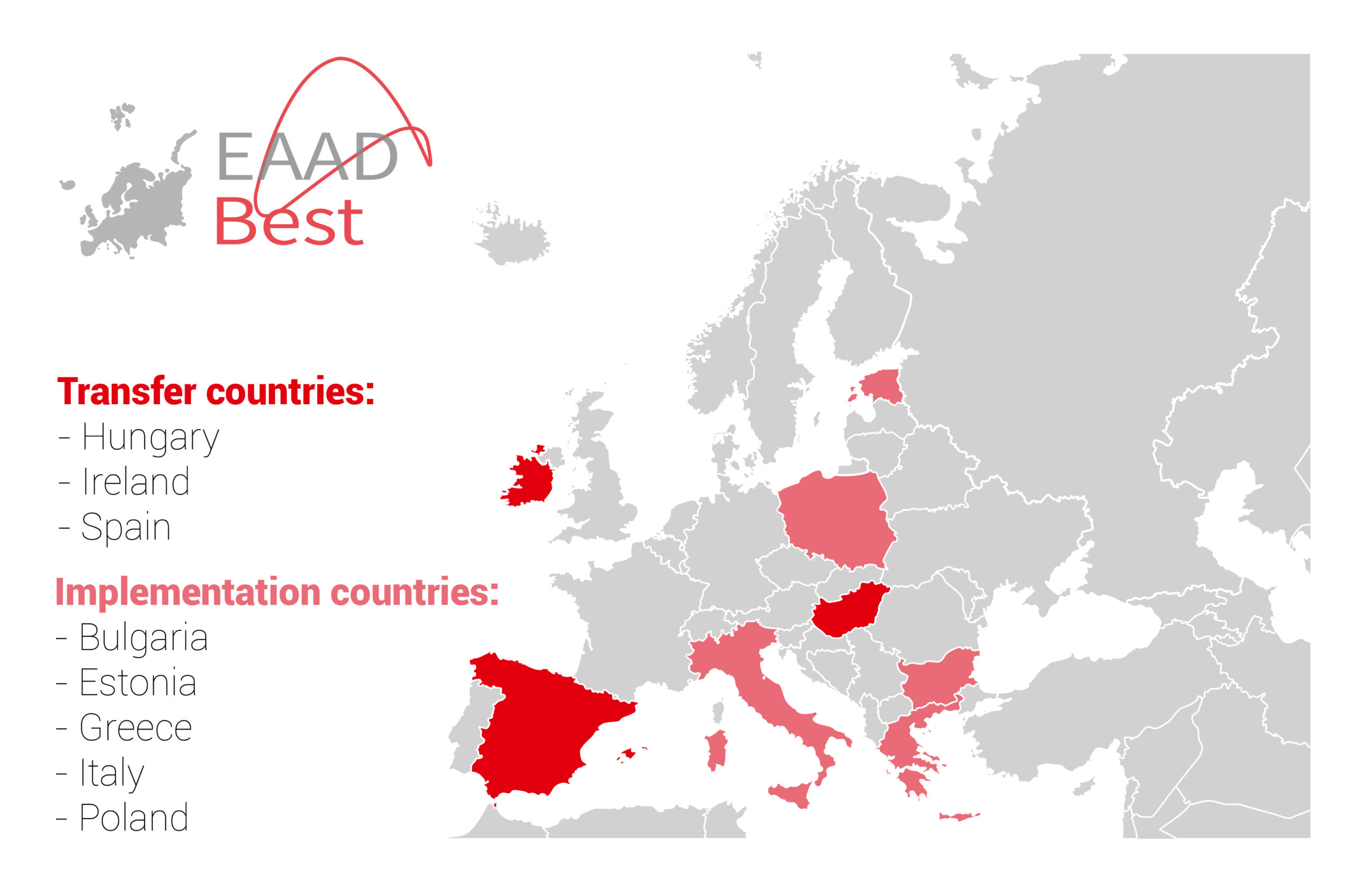
Centro de Investigación Biomédica en Red (CIBER) is a Public Research Consortium created in 2006 under the leadership of the Carlos III Health Institute (ISCIII). The ISCSIII is the main Public Research Entity responsible of funding, managing and carrying out biomedical research in Spain, to promote research excellence and build a critical mass of researchers in the field of Biomedicine and Health Sciences. Organized in 11 research areas, CIBER is the largest Research Network in Spain. CIBERSAM, the mental health division of CIBER includes 25 research groups in psychiatry, neuroscience and other disciplines related to mental health.
Role in the EAAD-Best project: National coordinator of the Ment-Best project in Spain.
Persons involved in the project:
- Víctor Pérez Sola. Psychiatrist. National coordination and leadership of the Researcher at CIBERSAM. Institute of Neuropsiquiatry and Addictions, Parc de Salut Mar of Barcelona.
- Azucena Justicia. Mental Health Specialist Nurse. Researcher at CIBERSAM. Hospital del Mar, Parc de Salut Mar of Barcelona.
- Saiko Allende. Psychologist. Researcher at CIBERSAM.
- Matilde Elices. Psychologist. Researcher at CIBERSAM. IMIM - Hospital del Mar Medical Research Institute.
- Other persons involved: CIBER partners from other regions of Spain. Benedicto Crespo-Facorro (Hospital Universitario Virgen del Rocio de Sevilla); Eduardo J. Aguilar (Hospital Clinico Universitario de Valencia); José Manuel Olivares Diez (Hospital Álvaro Cunqueiro de Lugo).
Key persons involved in the EAAD-Best project:
- András Székely, economist and teacher, has been active in preparation and implementation of projects, program management, organization and implementation of different EU programmes in Hungary (EAAD I, EAAD II, OSPI, PREDI-NU and Pro-Youth) and also the Hungarian projects of the Institute of Behavioural Sciences. He has been involved in data collection and developing the training materials of the programmes and in training of stress management and suicide prevention. He is a member of the Board at the Végeken Foundation where he is responsible for organizing the activities, trainings. He is the Hungarian representative of EAAD. With the Foundation he has implemented the EAAD 4-level programme at Szekszárd and its surrounding, financed by the European Social Fund. He is the organiser of the CallForHelp services which offers hotlines and services for health care and social care workers.
- Dr. György Purebl, MD, PhD, is head of Institute of Behavioural Sciences of Semmelweis University, Budapest. He was the president of the Hungarian Psychiatric Association (2016-2018). His specialist area is research and treatment of depression. He was involved as a researcher in the EAAD projects. In the OSPI-Europe project, he started as a researcher and took over the scientific leadership in 2012. In the EAAD network he is responsible for the scientific leadership in Hungary that is organised by the Foundation. He is coordinating the PhD research about the use of iFightDepression®-tool in Hungary. He was the leader of the Workpackage Taking Evidence-based Actions against Depression and Suicide and e-Health WP of the Joint Action on Mental Health and Wellbeing (2013 – 2016), co-funded by the Health Programme of the European Union. He has developed several self-management programmes for adults and adolescents.
- Dr. Mónika Ditta Tóth, PhD (Mental health sciences), is a psychologist and has been involved in several EU projects as a researcher. Her main activities are developing training, training materials and adapting them to the needs of the target population. She was involved in the Joint Action on Mental Health and Wellbeing (2013-2016) and the PREDI-NU project, and today she is responsible for the adaptation of the iFightdepression.com online self-management tool through the Foundation. As senior professional expert at the National Institute of Public Health in Hungary, she is responsible for the methodology of the Mental Health Centres in Hungary.
- Psychophysical and psychosocial community resilience and development
- Society mental health care promotion and advocacy
- Development and integration of innovative approaches and strategies in the fields of mental health, child and youth care advocacy, human right promotion
- Prevention of social isolation and discrimination of vulnerable citizens
- Counseling and supporting of the governmental institutions for development of strategies and policies
Project role: SPOC is the Bulgarian organization which main role is to implement the iFightDepression® tool in the country (implementation are: Sofia region). This includes translation and culturally adaptation of the existing evidence-based EAAD 4 level intervention materials, development and conduction of online training for professional guides, who will train the guide patients through the usage of the tool; organization of workshops for regional general practitioners and mental health professionals, building of a network for the implementation of the 4-level intervention concept, production and dissemination of project promotion materials.
Persons involved in the project:
- Yuri Katsarov – project expert, Clinical Psychologist
- Albena Drobachka – SPOC chairwoman
- Tsvetelina Naydenova – project expert
In our Department of Media Sociology and Social Communication we are committed to a research-in-action approach. We benefit from the wide range of facilities provided by a public university with a 100-year tradition, located in the central part of the capital of Poland. We work with professionals who in their academic and expert work address issues related to digital public life, community conversations, health promotion, human rights, and social dialogue. We address interpersonal, local and global communication, both in their traditional and new digital manifestations. We stimulate constructive discussion of issues important to communities, based on respectful dialogue, as well as attempts at understanding forms of social communication from the other end of the scale. We are familiar with digital product development and the specifics of user behavior in digital environments. As external tutors we co-train educators, psychologists, social workers and artists.
At EAAD-Best we lead the further development of an already existing non-commercial digital tool and its awareness-raising website designed for guided self-management of mild forms of depression. We aim at its implementation in several European countries. We are also adapting the best practice model of regional alliances against depression to Polish social conditions, starting from the central district of Warsaw. Informal allies in this alliance are all people, institutions and media interested in Warsaw city center who want to promote three ideas: depression can affect anyone; depression is a real disease; depression can be treated.
Piotr Toczyski, MPsych, PhD, complemented psychology and sociology studies with postgraduate qualification in psychological assistance and crisis intervention granted after two-year practical training. He is a certified supervisor of annual internships for psychologists entering the profession, who are working towards obtaining the European EuroPsy certificate, certifying that they practice psychology according to this standard. Dr. Toczyski has many years of management experience from the Polish and international non-governmental sector. He also served as a board member of a Brussels-based European organization of social communication practitioners and worked in the private sector for seven years as an independent market analyst in a publicly listed media company.
In South Tyrol (Italy) health care is guaranteed to all citizens and residents by a public system. Sabes is the provincial health agency and is administered according to the laws of regional autonomy. It serves an area of 540,000 inhabitants. It is divided into four psychiatric services (in seven hospitals in the province) that provide inpatient care with at least one overnight stay and specialist outpatient care. Sabes follows the objectives of the National and Regional Health Plans to defend the psychophysical health of the population. The aims of Sabes are to guarantee essential and uniform levels of health care in its territory, in line with the best scientific evidence; to provide necessary and appropriate services, compatibly with the allocated resources. The mission, which is common to the other services in Italy, is to treat and assist people suffering from psychological distress and to improve their quality of life according to the following values: attention to the person; integration between health services and the local community; constant search for areas of excellence.
The Bolzano Mental Health Service consist of two Mental Health Centres, a hospital ward, and two rehabilitation centres and territorial care and support area. The services are inspired by community prsychiatry. They offer specialised outpatient activity and supervise the planning, implementation and monitoring of therapeutic-rehabilitation project provided to patients. Altogether, the psychiatric services in Bolznano currently have almost 9,000 cases under their care: in addition, with approximately 2,000 new cases eaxh year, the percentage of depressive disorders is estimated at around 25%. In addition, 100 General Practitioners (GPs) are currently active in the Bolzano area.
Key persons involved in the EAAD-Best project:
- Andres Conca, Prof. Dr. med, psychiatrist and psychoterapist
Director of the Bolzano service since 2009. Coordinated the provincial child neuropsychiatry service. Former lecturer at the Universities of Innsbruck and Brixen. Speaker at various international scientific congresses. Coordinated numerous national/international projects and clinical studies in the field of mental health, prevention and rehabilitation, health promotion. He has more than 100 publications in PubMed with an H-index of 24 and 3000 citations. Member of provincial ethics committee and scientific supervisor. Member of several international scientific societies since 2015 he is a member of the national board of the Italian Society of Psychiatry (SIP).
- Andres Conca, Prof. Dr. med, psychiatrist and psychoterapist
Giancarlo Giupponi, Dr. med., psychiatrist and psychotherapist.
Deputy director of the Bolzano service since 2009. He was deputy director of the provincial child neuropsychiatry service. He is responsible for an external area. Already a lecturer at the University of Graz, he has been qualified as a professor of psychiatry since 2018. He has coordinated numerous national/international projects (including the EAAD for Italy until 2010) and clinical studies in the field of mental health, suicide prevention. He has more than 60 publications in PUBmed with an H-index of 17 and more than 1200 citations. Member of several international scientific societies since 2015 she is president of the 1010835 EAAD-Best 46 Trentino-South Tyrol Section of the Italian Society of Psychiatry (SIP).
ERSI is a non-governmental organization established in 1993 (www.suicidology.ee) in collaboration with Karolinska Institute, Sweden. ERSI is the strategic partner of the Estonian Ministry of Social Affairs and the coordinating partner of the Estonian Mental Health and Well-being Coalition (VATEK; www.vatek.ee) and collaborative contacts with leading universities in Estonia.
ERSI has specific expertise in the field of mental health, wellbeing, and suicidal behaviours. ERSI contributes to capacity building and policy making by integrating outcomes of evidence-based research into the area of public mental health practice.
ERSI has been involved in international EC funded projects mainly as work-package leader (MONSUE, FP7 OSPI- Europe, SUPREME, PREDI-NU, FP7 SEYLE, FP7 WE-STAY, ACTION-FOR-HEALTH), in mental health networks and policy development projects (IMHPA, EMIP, JA MH-WB), in the projects targeting mental health over the life-span (FP6 ProMenPol, T-MHP, MHPHands), WHO collaborative projects (SUPRE-MISS, HBSC), and AppsTerv developing web-based interventions, incl smartphone apps for suicide prevention and mental health promotion.
ERSI is the leader of EAAD-Best WP6 – Regional network building and implementation of the 4-level intervention concept in Bulgaria, Estonia, Greece, Italy and Poland
Key persons involved in the EAAD-Best project:
- Prof. Merike Sisask, PhD. Board member and senior researcher, leader of WP 6
Board member and senior researcher of ERSI, professor of social health care at Tallinn University, board member of Nõmme Health Clinic. Member and country representative of International Association for Suicide Prevention (IASP), member of International Academy of Suicide Research (IASR). Involved in several all-European intervention projects on suicide prevention and mental health promotion (FP7 WE-STAY, FP7 OSPI-Europe, FP7 SEYLE, EAAD, MHPHands, SUPREME, PREDI-NU etc). Author of numerous high-level thematic scientific publications.
- Prof. Airi Värnik, MD PhD. Board member
Psychiatrist, founder, principal investigator and board member of ERSI since 1993, professor emeritus of mental health at Tallinn University, full member of the International Academy of Suicide Research (IASR) since 2000, visiting professor at University of Tartu since 1998, visiting professor at Karolinska Institute (2003-2010), board member of Nõmme Health Clinic. Expert and principal investigator in several all-European intervention projects on suicide prevention and mental health promotion (FP7 ROAMER, FP7 WE-STAY, FP7 OSPI-Europe, FP7 SEYLE, EAAD, MHPHands, SUPREME, PREDI-NU etc). Author of numerous high-level thematic scientific publications.
- Peeter Värnik, PhD. Board member
Board member and senior researcher of ERSI, board member of Nõmme Health Clinic. Member of International Association for Suicide Prevention (IASP), member of Estonian Demographic Association. Involved in several international projects on suicide prevention, mental health promotion and epidemiology of injury deaths (FP7 WE-STAY, FP7 OSPI-Europe, FP7 SEYLE, EAAD, MHPHands, SUPREME, PREDI-NU etc). Author of numerous high-level thematic scientific publications.
- Agnes Sirg, Project manager in implementation region Pärnu, Estonia.
Peer support specialist on depression and suicide in family. Founder of the representative non govermental organization of peer support specialists.
EAAD is an international non-profit organisation based in Leipzig and Frankfurt am Main, Germany. EAAD’s international partner network spans 20 countries, including many in Europe but also Chile, Canada, New Zealand and Australia.
EAAD is considered a major player in international community-based suicide prevention efforts, due to the scientifically proven impact of its globally implemented 4-level concept. EAAD is proud to lead the EAAD-Best project, through which its dual goals of improving the care and treatment of patients with depressive disorders and preventing suicidal behaviour will be expanded across Europe.
In EAAD-Best, EAAD is the project coordinator and leads work packages 1 and 4.
The EAAD Team includes:
- Professor Ulrich Hegerl – President, EAAD and Professor Goethe University Frankfurt
- Pia Hauck – Project Manager
- Simge Çelik – Project Manager
- Dr. Katharina Schnitzspahn – Project Manager
- Dr. Kahar Abula – International Coordinator, EAAD
LUCAS KU Leuven is an interdisciplinary research centre of KU Leuven that was founded in 1989. The centre aims to improve quality of life by initiating and supporting innovations in care practice and policy. The focus is on mental health care, dementia, integrated care, welfare, poverty, social involvement and inclusion and communication in care relationships. Research topics in mental health care are (amongst others) in the field of prevention of suicide and depression, and promotion of mental health. LUCAS was involved in several European research projects on mental health realized with funding by the European Commission: a.o. OSPI-Europe (i.e., optimising suicide prevention programs and their implementation in Europe), PREDI-NU (i.e., preventing depression and improving awareness through networking in the EU), ASPEN (Anti Stigma Programme and Mental Health).
Role in the EAAD-Best project:In several EAAD led EU funded projects, LUCAS KU Leuven was responsible for the monitoring and evaluation of intervention and research programmes. Considering the extensive expertise of LUCAS KU LEUVEN in this regard, they have been allocated the task of monitoring and evaluation in the EAAD-Best project.
Persons involved in the project:- Prof. dr. Chantal Van Audenhove, Ph.D. is full professor in psychology and applied communication in the Department of Public Health and Primary Care, and head of Communication in Health Care Management of the Leuven Institute for Healthcare Policy. She is director of LUCAS KU Leuven and promotor-coordinator for the Policy Research Centre on Welfare, Public Health and Family.
Her research topics in mental health care are in the field of prevention of suicide and depression, vocational rehabilitation, evaluation of mental health reform, and recovery and patient participation in treatment choice. - Dr. Evelien Coppens holds a doctoral degree in clinical psychology. She is project leader mental health care and senior researcher at LUCAS KU Leuven. Her research topics are in the field of prevention of suicide and depression, stigmatization and social exclusion, and mental health care for young people. She participated in several international research consortia, and has published research reports and articles in internationally peer reviewed journals.
People involved in the project:
- Professor Ella Arensman – Chief Scientist, NSRF and Professor of Mental Health, University College Cork
- Dr. Grace Cully – Postdoctoral researcher, NSRF and University College Cork
- Mrs. Eileen Williamson – Chief Executive Officer, NSRF
- Mr. Niall McTernan – Executive Research & Operations Manager, NSRF
- Mrs. Eileen Hegarty – Operations Manager
